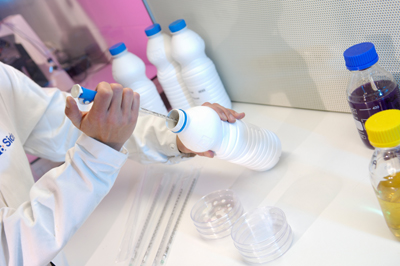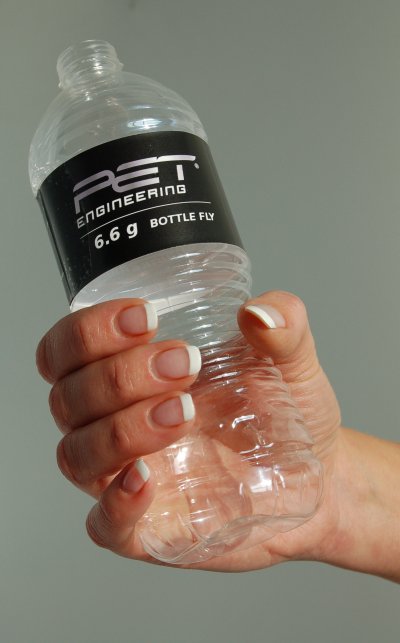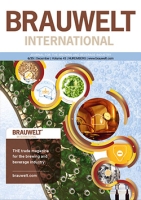A “little bit of aseptics” or a “floating concept involving normal operation, cold preservation or UltraClean” cannot assure sustained compliance with the necessary standards that have to be met by microbiological processes, as well as with hygiene and aseptic requirements in aseptic cold filling. As the diversity of beverages is forcing up the standards applicable in hygienic and aseptic filling, it is necessary to revise acceptance criteria accordingly for the filling equipment involved.
This service builds on Sidel’s existing PET package development offer. From bottle design to material selection, industrial feasibility testing and the control of mechanical performance, Sidel possesses well-recognized expertise in PET packaging development along with its knowledge of beverages. With an investment of one million EUR, Sidel has assembled the necessary resources to implement this new service.
“Our combination filling and packaging system is equipped to handle a variety of disposable and returnable containers such as returnable flip-top bottles, disposable bottles, cans and NRW-style bottles. This line assembles orders anywhere from 20 pallets to several hundred pallets in cooperation with the ordering and warehousing departments,” relates Uwe Daebel, production manager of the Paulaner Brewery in Munich as he describes the demands placed on the Krones line which was recently installed for Hacker-Pschorr and Paulaner products.
P.E.T. Engineering does not aim to achieving easy going records. According to the belief that a PET bottle corresponds to technology, resistance and lightness, and that its design has to be functional, the Research & Development department of P.E.T. Engineering challenged the market, proposing a 0.5 l. bottle with only 6.6 g. PET, which answers exactly to the standards of bottling, palletization, transport and marketing sectors, also concerning the vending machines.
The “First Obermurtaler Brewing Cooperative” is one of the last well-known Austrian private breweries. The rapid growth the brewery has experienced over the past years (+ 52 percent since 1995) can be attributed, in part, to the packaging in cardboard 6 and 4 packs beloved all over the “Alpine Republic”. A new repacking system has led to growth and increased sales for the brewery.
Cost leadership, ultra-affordable pricing, a complete range of products and (inter)national distribution are the four cornerstones on which the Oettinger company has been built. Doing without media advertising and costly packaging is part of the overall concept. The first non-returnables glass line has recently been commissioned at the headquaters in Oettingen. The line will mainly produce for export and was manufactured and installed by the Krones AG.
The primary functions of belt lubricants are to reduce the friction between the packaging containers and the conveyer belt as well as to sufficiently reduce the impact pressure on the containers accumulated along the conveyer belt. The dry belt lubricant system introduced below features numerous advantages.
Boon Rawd is once again on the crest of a wave. This Thai brewery group, drawing inspiration from its corporate traditions, is now back on level pegging with its competitors. After having been the undisputed market leader in this country’s beer market for about 65 years, enjoying something of a monopoly, Boon Rawd had lost substantial market shares to its competitors over the past ten years. But luckily, times change. With single-minded purposefulness, the group has invested in its chosen market and new state-of-the-art technology, thus catching up with what is meanwhile the second large brewery group in Thailand. In that same period, Boon Rawd managed to increase its output by far more than half in an expanding market.
On July 6, 2007, Hacklberg Brewery of Passau/Germany officially commissioned the new
Today, all metal cans used for packaging foods and beverages are lined with a thin polymer film, in order to prevent metal ions from migrating from the packaging into the product. A number of different beer samples taken from cans were tested for the presence of ortho-phenyl phenol, a compound which possesses fungicidal and bactericidal properties. The test results showed that use of this compound has increased over the past few years.




